A generation of retirees faces a daunting decision: to stay in the homes they’ve lived in for years or downsize into a community of peers.
| 2018 Q2 | story by Tara Trenary | photos by Steven Hertzog

JoAnn Johnson is a Lawrence senior who has decided to change her life. At 74, she’s very active, has numerous friends her age and younger, takes care of her 2-year-old granddaughter several times a week and travels whenever she can. She swims at her local gym three times a week and loves to go out on the town with friends. JoAnn leads a very healthy, active lifestyle.

JoAnn Johnson – retired and relaxing with a morning cup of coffee
Making the decision to leave her 2,800-square-foot home (and its considerable mortgage) behind has caused many a tearful night. JoAnn moved to Lawrence after retiring from a career in education to get back to her roots in the Midwest and at the University of Kansas (KU), where she went to college and taught for several years during retirement. She bought her house as a family base in this town, where most of her family members had gone to college and visited often for sports events, especially KU basketball games. She didn’t need a house that large for just herself and her husband, but she hoped having it would bring her family members together much more often during her retirement. And it did.
After losing her husband, JoAnn began to struggle a bit financially, with an HOA (home owners’ association) fee that was inconsistent and everyday expenses that continued to rise. Being on a fixed income made it hard for her to continue to do all the things she wanted to do in her retirement. She cut back on eating out, didn’t travel as much as she wanted and stayed home more often so she wouldn’t spend money. She worried about money all the time. It just wasn’t the retirement of her dreams.
So JoAnn, along with help from her kids, decided it was time to make a change. But what would she do? Where would she go? Should she buy a smaller home or move to a retirement community? What were her options?
“I bought my house with the idea of having it here for my kids to visit and for my grandkids to go to KU,” she says. “Now, it feels like I’m giving up my dream and stepping into a part of my life for which I don’t feel ready.”
All too often, this same scenario is played out in homes across the country. Kids push their parents to move to a retirement community because they worry about them living alone and something bad happening. Seniors push back because they don’t feel “old” or don’t want to face the fact that they are aging and might need some help.
Factors to Consider
There are many things seniors must consider when making this life-altering decision: physical and mental health changes, activity level, maintenance and security of the home, the isolation of living alone, difficulty of everyday tasks, eating right and taking medication properly. All of this and more has to be weighed against the fact that many seniors just aren’t ready to move to that next phase.
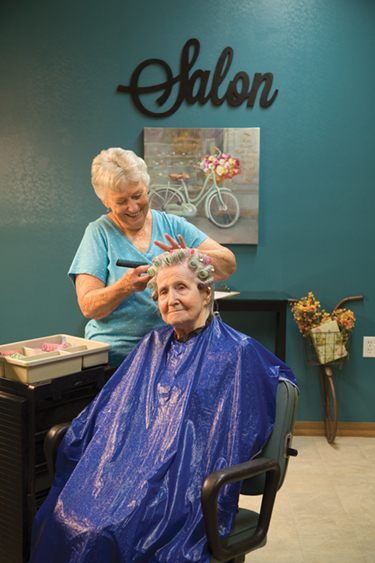
Getting hair done at Arbor Court Retirement Community Salon
“It is human nature to avoid the idea of aging and what our lives may look like as we decline, let alone the fact that we will all die one day,” explains Michelle Meier, director of community engagement, Senior Resource Center for Douglas County. “Having the tough conversations in advance can ensure that individuals can make decisions based on what they really want long-term rather than making the best-case-scenario decision in crisis mode.”
She explains there are three types of living in a retirement community that correlate with the main milestones of aging: 1) Independent Living, which allows retirees to get away from lawn care and home maintenance, but continue to lead active lives. 2) Assisted Living for some retirees who face health and financial issues, and can’t be quite as active and independent as they once were. 3) Skilled Nursing and/or Memory Care for seniors who need round-the-clock care.
However, Meier says the Senior Resource Center has found that many local seniors (with a focus on baby boomers) these days tend to want to stay in their homes as long as possible. “They want a lifestyle that involves more activity and involvement than the rest and leisure their parents wanted,” she says.
In lieu of “aging in place,” a term used to describe those seniors who make the decision to stay in their homes as long as they can, the problem retirees in Lawrence may face is the huge gap between high-end independent living and lower-income options. “Those who have limited funds have few options. There is not enough middle ground in this and most communities,” Meier explains.
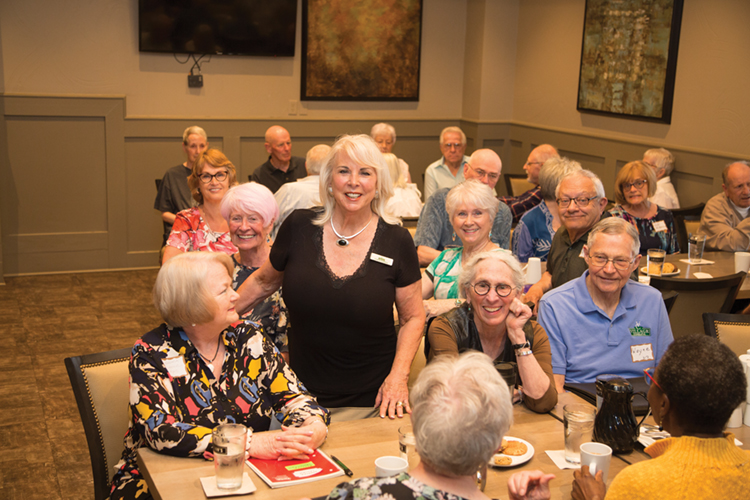
Cathie Rodkey, Sales Manager at Village Cooperative
Best Place To Retire
In an article in –Forbes– magazine in 2017, Lawrence was named No. 15 out of 25 of the best places to retire in the United States. It’s no wonder that graduates of KU, among many others across the country, flock to this active, diverse community, which offers quality medical care, top-notch restaurants, a hopping music scene, an eclectic arts scene, abounding educational opportunities, top-tiered high school and college athletics, a vibrant business district and an abundance of history, as well as close proximity to Kansas City and a major airport.
“Lawrence is an attraction for retirees,” explains Pat McCandless, broker and co-owner of Stephens Real Estate. “It’s a gem because retirees fit a little bit of everywhere in Lawrence. It’s not just a specified living-by-age community. That’s the beauty of our story.”
He believes we are on the cusp of a major demand for senior housing for baby boomers. “Finding homes that provide aging in place will be in high demand,” he says. One-level, zero-entry homes (no steps), wider hallways and doors for better accessibility, zero-entry showers, lower counters and cabinets, and enhanced lighting will be what seniors look for, he continues.
“If someone is specifically looking to purchase in a community that is 55 and up, the offerings [in Lawrence]are slim,” McCandless says. He believes most retirees want to move into neighborhoods that are not age-restricted, so the biggest challenge for realtors is finding homes/townhomes/condos that fit their preferences.
Being confident they are ready to make the downsizing, or “right-sizing,” move, as he calls it, is most important. “The number of baby boomers is enormous, and getting ahead of their needs and expectations is going to be paramount for the overall housing industry,” McCandless explains.
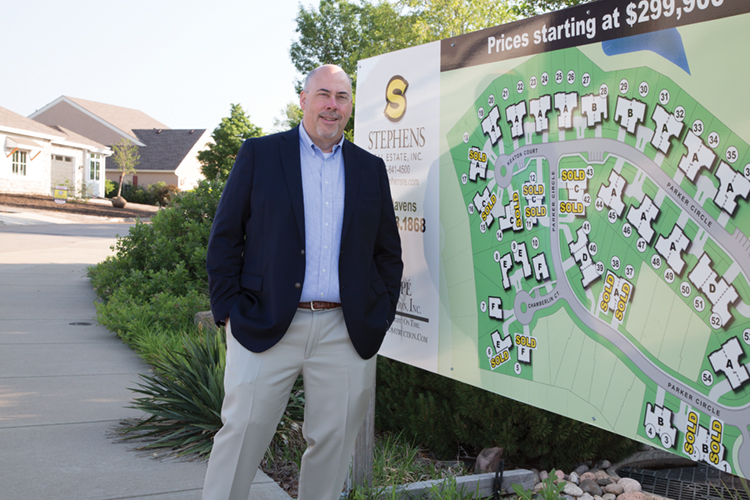
Pat McCandless, Stephens Real Estate
Renting Vs. Owning
Senior community living is available in Lawrence for those who seek that type of situation. The positives are a maintenance-free lifestyle with safety provided and social opportunities on-site. Many of the facilities, such as the Arbor Court Retirement Community at Alvamar, offer apartments for rent and specialized amenities such as therapy dogs, a health-care center, laundry service, movie nights, chef-prepared meals, book clubs, group outings, daily exercise and yoga classes, Bible studies, a beauty salon, a library, guest suites for family visits, beautifully maintained grounds with gardens, a deck and patio, and a FEMA-approved tornado shelter.
“If the stigma of a retirement community remains as the stereotypical institutional nursing home, people will continue to wait too long to enjoy what retirement communities have to offer,” explains Tracy Harmon, director of business development and marketing at Arbor Court.
She believes Lawrence has a particular need for good retirement communities because of its unique culture, recreation, sporting events, cost of living, low crime rates and mild four seasons. Having been named one of the best places to retire by many organizations, “we are becoming a hot spot for retirees, not just for Lawrence and Kansas natives, but folks all over the country.”
Sheri Van Auken, community manager at Prairie Commons, a pet-friendly, upscale senior living community in Lawrence, agrees. She says life in the “old neighborhood” can become isolating and unhealthy for some older residents as the community evolves and changes. “A community of fellow active seniors can be just the ticket to a new beginning,” she says.
Prairie Commons, a 55-and-up community in the heart of Lawrence’s west side, also offers seniors rental apartments and is in walking/short-driving distance to grocery stores, banks, pharmacies and other recreational and medical facilities. It offers social activities such as potlucks, pancake feeds, pizza parties, bridge, bingo, the bookmobile, a library, a clubhouse with a busy social calendar, health clinics, classes and cultural events. The difference, Van Auken explains, is that its residents don’t pay for extras such as meal prep, housekeeping and medical services they don’t need, which allows Prairie Commons to keep the rent lower. In a smaller apartment setting, she says contracting out those amenities is much less expensive for the resident.
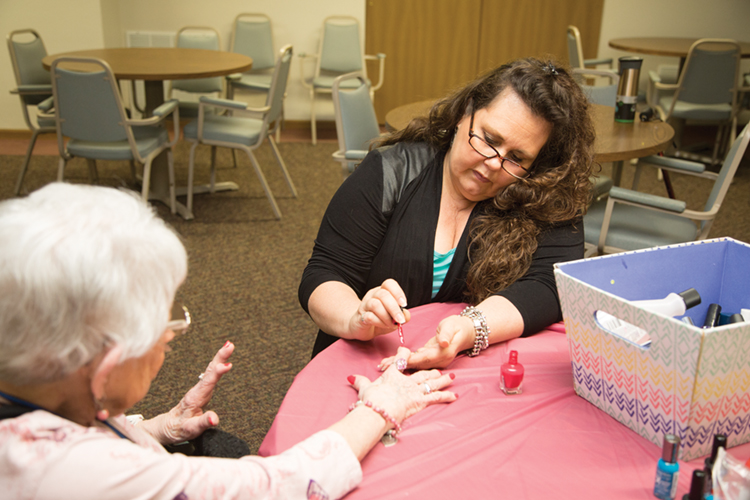
Tracy Harmon, Director of Business Relationships at Arbor Court
Owning Vs. Renting
Though apartment living is a good option for some seniors, others may feel strongly about owning their own property while still wanting to be part of a community of peers. That’s where the Village Cooperative, which opens in summer 2018, comes in.
“Here at Village Cooperative of Lawrence, we are a 62-and-up community of members who want the freedom to play and travel while having the benefit of home ownership without the work,” explains Cathie Rodkey, sales manager at Village Coop. “The ability to decide to leave for a few days by just closing a door without worry is a very freeing experience.”
She says a retiree used to be pictured as someone whose highlight of the day was “getting to a rocking chair. Not today, and not in Lawrence,” she stresses.
The very first owner-occupied senior housing cooperative in Douglas County, Village Coop members will enjoy a club room, community room, private dining room, exercise room, underground parking with car wash, raised outdoor gardens, woodworking shop, craft room, gazebo with grill and fireplace, member services manager and free “while you’re away” services, allowing members to travel to a second home or places they have always wanted to visit without worrying about the safety and security of their home.
“I think the baby boomers are a new breed of seniors,” Rodkey says. “We have spent our lives working and ‘doing’ for not just ourselves and our families, but for others and our communities. Our newly found free time becomes so limited during retirement, because we are busier than ever. We are more socially conscious of giving back, enjoying travel and ‘our retirement time,’ downsizing lets us have more time to do as we please.”
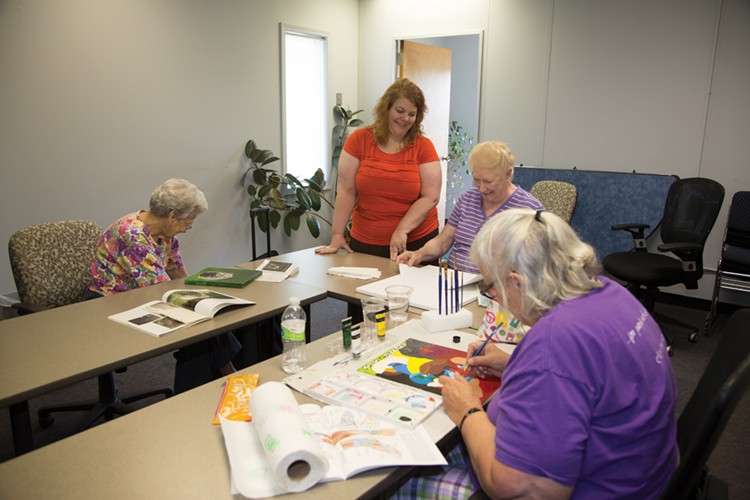
Michelle Meier, Senior Resource Center
What Is Right for Me?
No matter what, making the decision about whether to downsize for seniors can be one of the toughest they will face. With such an active community of seniors here in Lawrence, it’s no wonder there are many options from which to choose and many factors, including major ones like finances and health, to consider.
With her house on the market and no real plan yet in sight, JoAnn is still grappling with her decision about whether to downsize into a smaller home or join one of the senior communities Lawrence has to offer. “It’s too early for me to say. Mentally, I’ve just moved into this ‘senior’ category since I’ve had to face the reality of not being able to pay for or physically do everything I’ve always done,” she says. “I’m just not sure right now where I’m going to land.”
But one thing is for sure: She started the process early enough to make the right decision while she’s still active and has plenty of time and health to enjoy her life.
The key to the whole process? Senior Resource Center’s Meier advises: “Plan ahead and seek assistance. This process can be much smoother when done with a clear mind rather than making choices in a crisis situation. The process can be overwhelming in the best of circumstances but can be made much smoother with support and a plan.”

